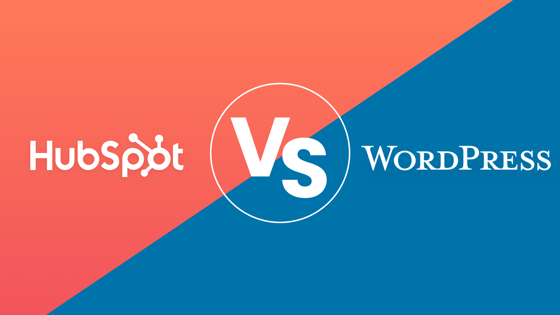What is more challenging than moving your website to a new platform?
Having to switch to another platform and re-do the whole process all over again six months later.
WordPress is a giant in the website space owning over 40% of the current market share, while HubSpot is a marketing-driven website platform built for lead generation. Knowing the pros and cons for both will help prepare you to make an informed decision on which platform fits your company best.
Without this information you run the risk of choosing a platform to later find out, it doesn’t suit all your business needs or it’s too challenging to make it happen.
Let’s explore the pros and cons of each platform so you don’t have to worry about switching website platforms later on.
HubSpot vs. WordPress: A Closer Look
The Pros Of HubSpot
70% of marketers say converting leads is their top priority. So, if that's your goal, HubSpot should be a top contender.
HubSpot helps marketers master the art of lead nurturing and engagement with tools that personalize and optimize campaigns.
The all-in-one solution caters to marketers from all backgrounds, with intuitive features for various skill levels.
Here are all of the pros of using HubSpot:
- Easy-To-Learn: Get started right away with its intuitive interface. Enhance skills over time with HubSpot Academy, which has certifications, videos, blog posts, and other content for all skill levels.
- Advanced Nurturing Tools: Segment, nurture, and guide leads through the funnel using smart lists, lead scoring, triggered workflows, and sales sequences.
- Robust Content Creation: Create content that personalizes based on the information you have about a lead. Start using smart content on emails, website pages, landing pages, and forms created within HubSpot for better engagement with potential customers.
- Advanced Blogging Capabilities: Draft and publish mobile-friendly, SEO optimized posts with smart CTAs. Schedule in advance and analyze post-performance.
- Selection Of Pricing Tiers: There's a pricing tier for everyone, including Starter, Professional, and Enterprise. For example, CMS Hub runs at $300/month for Professional and $900/month for Enterprise. You can also subscribe to other packages like the Marketing Hub Starter at $50/month, or the Growth Suite where you can get 25% of your plan by bundling.
With the Marketing Hub, CMS Hub, Services Hub, Sales Hub, and a dynamic CRM, HubSpot is an all-in-one solution. There are also robust integrations, such as WordPress, Salesforce, SurveyMonkey, GoToWebinar. All tested by the HubSpot team.
The Cons Of HubSpot
HubSpot offers a lot of capabilities for marketing and sales teams, but it’s not the right tool for everyone.
Here are some of the cons of HubSpot:
- Costly Enterprise Package: The tier with the best features, such as event-based segmentation and predictive lead scoring, is $3,200 a month, and not a feasible option for small teams with budget constraints. The alternative is using a lower-priced tier of HubSpot, called HubSpot Starter CMS, which is more affordable options for teams. Either way, we're going to show you how to save up to 60% on your first year of HubSpot at the end of this post.
- On-Boarding Required: With HubSpot, you have to pay for onboarding. It can cost up to $5k. The fee is not optional (though we can show you how to save up to 60% on your first year, below).
One of the biggest things to understand about HubSpot is that it requires a time investment beyond the purchase. To gain value from HubSpot, you need to look beyond the initial financial investment and focus on the potential ROI.
Dedicate time to onboard your team. Establish new or updated processes to support it, and optimize and set goals to ensure you can prove its value.
WordPress Pros
Nearly 53% of marketers categorize blogging as a top priority. So, for companies building a website or a blog for the first time, WordPress is a strong choice. A lot of smaller organizations and bloggers use the customizable open-source content management system.
Here’s what they love about WordPress:
- Affordable: Where HubSpot is expensive, WordPress is free. It’s easy to get started, and most of the costs you’ll experience are for premium themes, plugins, and hosting (which can get expensive if you have a lot of traffic). There are lots of training tools out there, but, obviously, no required onboarding fees.
- SEO Benefits: WordPress has a variety of plugins to help you improve your rankings and site searchability. You can connect your Google Analytics account up to your WordPress site to gain even more insights into what’s working and what isn’t.
- Customizable: You can browse hundreds of free and premium WordPress themes to see which one works the best for your brand.
WordPress requires a significant investment of time. There's the opportunity for ROI, but you need to get your site set up, analytics configured, and plugins in place. You'll need to research and determine which tools you’ll use to support goals and objectives, and implement an integration to track performance.
WordPress Cons
It’s good to think about WordPress as an affordable, DIY platform. You’ll get out of it what you put in it. For teams looking to get their hands dirty, this platform could really work for you. However, as many former users have noted, this approach isn’t a fit for everyone.
Here are a few things about WordPress that might prevent you from using it:
- CSS/HTML Experience Needed: Whether it’s a team member you hire, or yourself, to use WordPress, you will have to learn how to code in some capacity. Otherwise, you will need to work within the constraints of your theme or design.
- Plugin Maintenance: Remember what we said about this not being a plug-and-play platform? While there are a ton of plugins to choose from, they all occasionally need to be updated. They can break, or get buggy. Someone needs to monitor that consistently.
- No Automation Support: Yes, some plugins can help you set up an email list, run analytics, create forms, and so forth. But these all work independently. WordPress does not come with marketing automation tools like HubSpot does.
For companies with a dedicated developer, or with team members that really want to be hands-on, WordPress is an option. However, if your team is inexperienced in marketing, or is looking for a tool that will automate everything for them, WordPress will not be an ideal solution.
Why You Should Choose WordPress
In short, WordPress is a highly customizable platform that works well for large, high-budget businesses that can afford to commit extra time and budget to hire a developer and designer and build everything from scratch.
Due to WordPress being a completely customizable platform, any of your website functionalities are possible with the right plugins and custom code. If you're looking for a platform that is not necessarily user-friendly but you're able to build everything from scratch, WordPress is the best choice for you.
For small business owners who are looking to learn an advanced platform and website development, WordPress can also be an interesting, long-term project. The main caveats to WordPress as a HubSpot alternative are the lack of marketing capabilities built into the platform and the lack of user-friendliness.
Why You Should Choose HubSpot
The key to building a website for your business is not only what the website platform is capable of, but also how the website can improve your business.
For companies looking to grow and scale, HubSpot is the right choice.
Not only will marketers have the continued support and resources of the HubSpot team and HubSpot Academy, but the tools are also really easy to use and pick up on. Team members won’t have to wait before using the platform and can learn as they go. HubSpot automates processes while giving you all the resources needed to fully nurture and engage with potential customers.
Even with the HubSpot Pros and Cons, HubSpot outperforms the alternatives in terms of drag-and-drop functionalities, user-friendliness, and marketing functionalities. Even big automation players such as Marketo can't compete with the support team, knowledge base, advanced personalization, nurturing features, and complete alignment between sales and marketing teams.
How To Save 60% On Your First Year With HubSpot
For us, HubSpot will always be the clear winner. We know from experience that teams looking to grow and scale their inbound and sales efforts see a lot of success with HubSpot.
If you’re considering HubSpot, but stuck on the price, we've got your back. You can save up to 60% on HubSpot by reading our savings guide.
As an Inbound Writer for Lean Labs, Melissa writes about high-converting websites and customer-centric marketing. She's an avid traveler, with trips to Iceland, Ukraine, and Portugal under her belt. She currently resides in Wilmington, North Carolina with her dog, Morrie.




